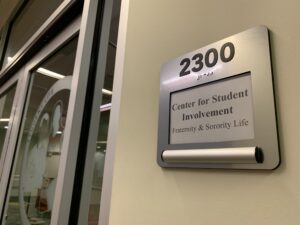Greek life funding allocation at risk

After years of irregularities on the use of the Marshall Student Center (MSC) Security Fund, Student Government (SG) established new limitations for student organizations.
The new clause, however, raised concerns to Fraternity and Sorority Life after they were restricted from utilizing the funds for its events throughout the year.
The MSC Security Fund is allocated from the Activity and Service (A&S) fee to provide security for public events in the MSC. Dean of Students Danielle McDonald said $68,400 was allocated this year for the fund.
With the new clause, the MSC can only allocate money from the fund for events hosted by A&S-funded organizations on campus.
When filing the forms to reserve a space at the MSC, a risk assessment is taken to determine whether or not additional security is required for a certain event, such as events with a large rate of attendance and ones open to the public.
Without the fund, non-A&S-funded student organizations would have to pay out of their budget to have security presence during their events at the MSC. According to University Police’s website, the rate per hour to have an officer during an event is $47.
Interfraternity Council President Jacob Lenamond said the councils felt at a disadvantage when the clause first passed as they were not involved in any discussions regarding the future of the fund.
“Losing the MSC security funding would put us in a situation where our events would have to move off campus or take place somewhere else, which gives no exposure to people that aren’t in the community to see it,” Lenamond said. “I think it’d be a shame to not have that opportunity to showcase it in front of the MSC where we’d like to celebrate that community together.”
In addition to lack of representation, Lenamond said the change would affect each chapter financially.
As each Greek chapter is not A&S-funded, part of their budget comes from member fees. With the change of the clause, they would have to allocate money from their budget in order to request an officer’s presence at their events.
“It’s not something that’s not in our budget to handle those kind of funds,” Lenamond said. “It’s been expected to be covered in the past in the same way that room reservations for chapters work, no one’s budgeting for the expenses for that.”
The bill was discussed and approved by the SG Senate on Oct. 15, with 39 votes in favor and three votes against it.
Student Business Services (SBS) and MSC administration brought to McDonald’s attention the irregularities being made regarding the use of the MSC Security Fund by non-A&S-funded organizations.
The irregularities were noticed in April by the MSC administration. Ever since then, non-A&S-funded organizations have not been granted access to the fund.
The clause was supposed to be discussed during the summer, according to McDonald. However, due to changes in Senate leadership, the meeting was postponed to the fall semester.
“I think the fund is really important, otherwise all student organizations would have to get their own insurance and would have to pay for that security on their own, which could then limit the types of events that the students have,” McDonald said.
Senate Pro Tempore and author of the bill, Hernan Benavides, said that prior to the addition of the clause in Title 8 of the SG statutes, there were no regulations regarding the use of the MSC Security Fund.
The clause is pending the approval of Student Government Body President Britney Deas, who has the power to either approve or veto the clause.
“So the conversation has really come down to where we’re talking to Deas to see what would be more efficient and effective as we also want them to be able to promote the compliance and unification of their documents,” Lenamond said. “We don’t want this to hinder any processes, we just don’t want to lose our representation on campus.”
Benavides said regardless of Deas’ decision, he will work towards a clause that is more inclusive to all parties involved. However, if she vetoes it, Benavides said he will draft a new clause and have it by the first week of November.
“We are trying to make it available for all student organizations regardless of its A&S eligibility status,” Benavides said. “We’re trying to find a solution to these two things that I didn’t foresee to happen when writing the clause. But now we will work on a solution that both parties will be comfortable passing.”
Discussions have been held between Fraternity and Sorority Life and SG to find a common ground regarding the use of the fee, according to Benavides.
Among the changes being discussed, the MSC Security Fund may become available for all student organizations regardless of their A&S eligibility status, according to Benavides.
“We just want to maintain the standard we’ve already had with the security funding and I think that’s something that is bare bones and reasonable,” Lenamond said. “If the university asks us to provide safe and secure public events, we just want to be able to maintain that ability to do so on campus without having to remove our heritage, tradition and culture from campus that anyone can attend and witness.”






